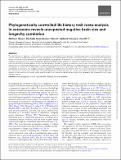Files in this item
Phylogenetically controlled life history trait meta-analysis in cetaceans reveals unexpected negative brain size and longevity correlation
Item metadata
| dc.contributor.author | Groot, Nikita | |
| dc.contributor.author | Constantine, Rochelle | |
| dc.contributor.author | Garland, Ellen Clare | |
| dc.contributor.author | Carroll, Emma Louise | |
| dc.date.accessioned | 2023-02-09T12:30:08Z | |
| dc.date.available | 2023-02-09T12:30:08Z | |
| dc.date.issued | 2023-02-01 | |
| dc.identifier | 282345925 | |
| dc.identifier | 38ab55f5-6a42-4420-934b-05f249dcd436 | |
| dc.identifier | 85147458328 | |
| dc.identifier.citation | Groot , N , Constantine , R , Garland , E C & Carroll , E L 2023 , ' Phylogenetically controlled life history trait meta-analysis in cetaceans reveals unexpected negative brain size and longevity correlation ' , Evolution , vol. 77 , no. 2 , qpac050 . https://doi.org/10.1093/evolut/qpac050 | en |
| dc.identifier.issn | 0014-3820 | |
| dc.identifier.other | ORCID: /0000-0002-8240-1267/work/128568214 | |
| dc.identifier.uri | https://hdl.handle.net/10023/26928 | |
| dc.description | Funding: ELC was supported by a Rutherford Discovery Fellowship from the Royal Society of New Zealand Te Apārangi and EG was supported by a University Research Fellowship from the Royal Society of London. | en |
| dc.description.abstract | The identification of patterns in trait evolution is essential to understand the interaction of evolutionary forces, and provides useful information for species management. Cetaceans are a phylogenetically well-resolved infraorder that exhibit distinct trait variation across behavioural, molecular and life history dimensions, yet few researchers have applied a meta-analytic or comparative approach to these traits. To understand cetacean trait evolution, we used a phylogenetic generalised least squares approach to examine the cognitive buffer hypothesis (CBH). A large brain should buffer individuals against environmental challenges through increasing survival rates, and a longer lifespan should buffer individuals against the cost of extended development for larger brains according to the CBH, leading to an expected positive correlation between brain size and lifespan. In contrast to this expectation, previously observed in taxa including primates, we found a negative correlation between brain size and lifespan in cetaceans. This suggests cetaceans experience selective pressures different from most other mammals in these traits but may be more similar to some social mammalian carnivores that display alloparenting. We also provide a comprehensive dataset to explore additional aspects of trait evolution but which would greatly benefit from studies on behavioural ecology across cetaceans and increased focus on data deficient species. | |
| dc.format.extent | 16 | |
| dc.format.extent | 1059053 | |
| dc.language.iso | eng | |
| dc.relation.ispartof | Evolution | en |
| dc.subject | Behavioural evolution | en |
| dc.subject | Cognitive buffer hypothesis | en |
| dc.subject | Phylogenetic analysis | en |
| dc.subject | Review | en |
| dc.subject | QL Zoology | en |
| dc.subject | DAS | en |
| dc.subject | MCC | en |
| dc.subject.lcc | QL | en |
| dc.title | Phylogenetically controlled life history trait meta-analysis in cetaceans reveals unexpected negative brain size and longevity correlation | en |
| dc.type | Journal article | en |
| dc.contributor.institution | University of St Andrews. School of Biology | en |
| dc.contributor.institution | University of St Andrews. Centre for Biological Diversity | en |
| dc.contributor.institution | University of St Andrews. Sea Mammal Research Unit | en |
| dc.contributor.institution | University of St Andrews. Centre for Social Learning & Cognitive Evolution | en |
| dc.identifier.doi | https://doi.org/10.1093/evolut/qpac050 | |
| dc.description.status | Peer reviewed | en |
This item appears in the following Collection(s)
Items in the St Andrews Research Repository are protected by copyright, with all rights reserved, unless otherwise indicated.

